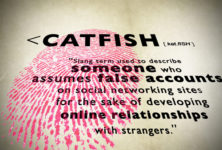Should Catfishing be a Crime?

The parents of a 20-year old woman who disappeared after becoming a victim of catfishing, are now calling for the behaviour to be made a crime in its own right.
What is catfishing?
Catfishing is generally the term given to ‘fake’ online relationships. These relationships are usually romantic in nature, but on one person’s side are completely duplicitous. One party will sustain the online relationship but never actually want to take it offline. They can string the other person along for months, sometimes years.
It’s difficult to understand why catfishers do this. Some believe it’s a form of addition. Some believe that people suffer low self-esteem and choose fake personas to feel better about themselves. At other times there are more obvious reasons: a person wants to extract money from the victim, or even groom young people for sexual gratification.
Often when victims find out that the relationship was simply a web of lies, they feel devastated. Often future hopes, dreams and plans are crushed, and they feel shameful and humiliated that they let themselves be taken for a ride. The fallout can be traumatic.
And while catfishing is not a crime in and of itself, there are situations where the conduct can amount to a criminal offence.
The story of Renae Marsden
Renae Marsden was one such victim. An inquest into her death is due to begin in the New South Wales Coroner’s Court, and it will hopefully determine the circumstances in which she died. Renae was last seen by her parents at her Sydney home on August 5, 2013. She told them she was heading out to dinner with friends, but police believe she drove to The Gap in the eastern suburbs, before throwing her phone into the ocean and then taking her own life. Her body has never been found.
Renae’s parents believe that, earlier in the day, she had found out that the man, ‘Brayden’ she had thought she was in a relationship with for the previous 18 months was simply made up by a friend. Brayden was the last person Renae texted before she disappeared. The contents of the text message have not been made public.
As their online relationship developed, ‘Brayden’ sent Renae more than 11,000 text messages over the course of 18 months, but Renae never met him in person. Brayden’s backstory included details that he was in prison, but that his parents had been able to pay off prison staff in order for him to have a phone. Renae’s phone records show she called Goulburn prison on the day she disappeared.
Even today, Renae’s parents don’t know if ‘Brayden’ exists. They suspect he was made up by one of Renae’s friends who they say was obsessed with her.
While sometimes Catfishers make up multiple different personalities and seek fake relationships online, some are actually real people who lie about their circumstances, for example they may be married, or in a relationship and don’t have any intention of taking the relationship further. Catfishing is, without a doubt, predatory and immoral and a malicious form of manipulation, but it is not against the law.
Time to change the law?
Renae Marden’s parents are calling for change.
Currently in NSW, while catfishing is not a crime in its own right, there are some aspects of current law which may apply in certain circumstances. There are criminal laws relating to fraud as well as against procuring, grooming or preparing or planning to engage in sexual activity with underage persons.
Very serious can apply to people who prey on children online. Carly’s Law was introduced into Federal Parliament in 2017, enabling authorities to prosecute anyone lying about their age to minors online as well as providing other powers of intervention, designed to ensure police can act long before a predator has the opportunity to, and therefore better protect children online. Offenders face up to 10 years’ imprisonment.
If you suspect that you are the victim of catfishing, be aware that it is behaviour which generally contravenes the terms of use of social media and dating sites, and you can contact the platform to have the offender’s profile suspended.
Catfishing as identity theft
Remember too, the term catfishing can also be used to describe a circumstance in which someone has created an online profile using your photos, name and other personal details, essentially impersonating you. This is a form of identity theft, which is also a crime, and needs to be reported to police immediately.







